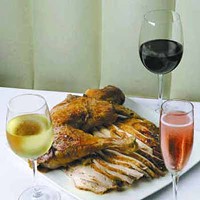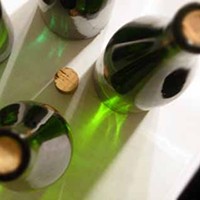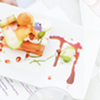When more Europeans began arriving on America's shores, they brought cuttings from vineyards back home. The grape, called the "Mission Grape" since Franciscan monk Junipero Serra spread the variety throughout California while establishing missions, dominated California's wine production until the mid-1880s, when other European varietals arrived. A Hungarian soldier named Agoston Harazsthy began importing cuttings from famous vineyards all over Europe, introducing 300 different grapes to California. Harazsthy, considered the hero of California wine, founded the Buena Vista Winery, still thriving today.
Then, just as American wine was earning international recognition, all hell broke loose. In 1920, crackpots convinced that everyone was an alcoholic introduced the Volstead National Prohibition Act, taking away American's right to drink. Overnight, otherwise law-abiding citizens became illegal bootleggers, and grape juice production took the forefront. Vintners began pulling up their fine wine grapes, replacing them with grape juice varieties, and weeping over the loss.
Innovative growers turned to raisin production, partially saving the struggling California grape industry. In 1876, William Thompson, a creative Scot immigrant, had introduced the first seedless grape, Thompson Seedless. Thin-skinned, sweet and easy to grow, this light green, oblong grape you now find in produce sections everywhere, easily became the favored fruit for raisins and table grapes. Some vintners experimented using the grape for wine, but quickly realized it produces tasteless, acidic juice. Thompson Seedless, a modified Vinifera grape, is now the widest planted grape in California, and still shows up in 3-liter jugs of white bulk wine.
After Prohibition ended in 1933, the once thriving wine industry was all but destroyed. Although some ingenious wineries obtained licenses to produce sacramental or medicinal wines during Prohibition, the industry pretty much dried up to 100 wineries. Before 1920, 2,500 wineries called the US home, and, as of 2001 we've recovered to 1,800.
So this story has a happy ending, since wine consumption has dramatically risen in recent years. But to make sure your choice remains unhampered by political agendas, keep track of your congressmen and senators... they could make your wine life easier or harder. To do so, check out www.freethegrapes.org.
The Wine List
2000 Bordeaux Carolina Wine Company hosts "2000 Bordeaux." Limited to first 40. Call for reservations. Duke Mansion, Charlotte. Sun., June 22, 4 p.m. $55 per person. 888-317-4499.
Four for Friday Four premium wines are featured in four ways: 2 oz. sample, 5 oz. glass, by the bottle or in a flight. Fridays. $20. Reid's Fine Foods, 7th Street Station. 704-377-1312.
Red Blends of the World Unique red blends from Italy, Spain, France, Australia and US. Wine class limited to 12 people. Reservations required. Tue., June 24, 7-8:30 p.m. $20. Southern Spirits, Hwy 521. 803-548-8888.
Six Italian Estate Wines Wines sampled from various regions and price ranges. Registration required. Thu., June 19, 7-9 p.m. $12. Kee-Kee-Rikee, 219 Main St., Pineville. 704-889-5333.
Tasting of Jorge Ordonez Spanish wines Free wine tasting limited to 40 people. Reservations are required. At The Hyatt Hotel, 5501 Carnegie Blvd. Sponsored by the Wine Shop. Wed., June 18, 6-8 p.m. 704-377-5373.
Wine & Food Tastings Third Wednesday of every month, 5:30-8 p.m. Something Classic at the Villa, 715 Providence Rd. 704-347-3666.
Wine Classes Purchasing Wine. The Plan-a-Gram, Shelf location, categories, value of promotions - entry level classes. www.carolinawineclub.com. June 24 at Mint Museum of Craft & Design, 6:30-8pm. June 25 at The Design Center - Westye Group Kitchen, 10am - 11:30am. $30. 704-344-8027.
Wine Classes June 21 - Cabernet. Great for beginners. Every month on the first and third Saturday, 12:30-1:30pm. $15. Dean & Deluca Wine Room, 6822-G Phillips Place Ct. 704-552-5283.
Wine Dinner Take a trip to Paris without leaving Charlotte for a menu paired with a collection of classic bistro wines. Call for reservations. Sponsored by the Wine Shop. Wed., June 25, 7 p.m. $65 per person. Patou, A French Bistro, 2400 Park Rd. 704-376-2233.
Wine Tastings Wednesdays, 6-8 p.m. $10. Barone's Wine Room, Birkdale Village, Huntersville. 704-987-0011.
Wine Tastings Six wines tasted, which follow a monthly theme. Last Tuesday of every month, 5:30-7:30 p.m. $15 per person includes light hors d'oeuvres. Nectar, 1730-A E. Woodlawn Rd. 704-519-4174.
Latest in Corkscrew
More by Taylor Eason
-

Wines to pair with the feast and fowl
Nov 17, 2009 -

Wineries embrace social media but how well?
Nov 10, 2009 -

Riesling revival: It's one versatile grape
Nov 3, 2009 - More »
Calendar
-

Charlotte Wine & Food Week’s Annual Sake Dinner at Mizu @ Mizu
-

Hands On Cocktail Class Featuring Gin at DTR Southpark @ DTR SouthPark
-

Charlotte Wine + Food Week Presented by Truist @ Charlotte, NC
-

Angeline’s Featuring Sciandri Family Vineyards @ Angeline's
-

Aria Tuscan Grill Featuring Allegrini - Charlotte Wine + Food Week @ Aria Tuscan Grill
-
Vegan CEO Talks Meatless Mondays and Learning the Lifestyle
Planting the seed
-
Back of the Box: No Boil Classic Lasagne 5
Not having to boil the noodles rocks!
-
Authentic & Delicious Indian Restaurant Botiwalla NOW OPEN in Optimist Hall! 2







